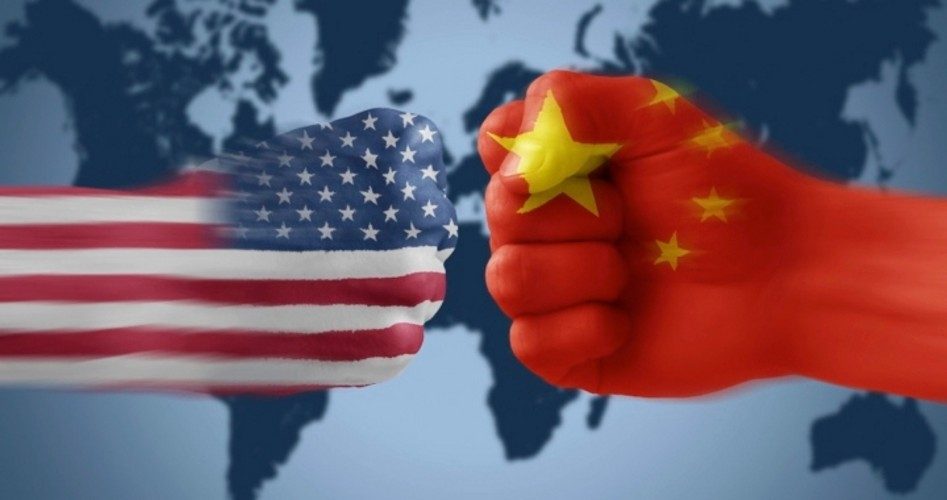
In his announcement applying tariffs to another $200 billion of Chinese imports on Monday, President Trump made clear the reason for the tariffs:
We are taking this action today [because U.S. Trade Representative Robert Lighthizer] concluded that China is engaged in numerous unfair policies and practices relating to the United States technology and intellectual property — such as forcing United States companies to transfer technology to Chinese counterparts.
These practices plainly constitute a grave threat to the long-term health and prosperity of the United States economy.
The tariffs effective on Monday, September 24 on some 5,000 Chinese-made products will be set at 10 percent and increase to 25 percent starting January 1, 2019 unless China negotiates terms acceptable to the president before then.
At present China is presenting itself as an immovable object. Chinese Foreign Ministry spokesman Geng Shuang, in anticipation of Trump’s announcement, said, “If the U.S. imposes any additional tariffs in China, we will have to take necessary countermeasures and resolutely safeguard our legitimate and legal rights and interests.” True to his word, China imposed its own set of tariffs on an additional $60 billion of American exports going to China, bringing the total exports subjected to Chinese tariffs to $110 billion.
It should be made clear that this escalation doesn’t pit American companies against Chinese companies. It pits American companies against the Chinese communist government, which is using its state-owned and controlled companies as proxies in a war against the United States. It’s a war that has only recently been recognized by the American people, and it’s a war that the American people have been losing as a result.
Without saying so, the president has met the enemy and is now waiting for the other side to blink. His selection of Monday, September 24 as the date for the imposition of the new round of tariffs was deliberate: it falls three days before the start of trade negotiations with Chinese representatives in Washington. The message: You’re not dealing with Obama. Trump added, “If China takes retaliatory action against our farmers or other industries, we will immediately pursue Phase Three, which is tariffs on approximately $267 billion of additional imports.” That would target essentially all the goods imported from China into the United States.
It’s a war that China cannot win. As Lingling Wei, a reporter who covers Chinese finance for the Wall Street Journal, noted, “because China imports far fewer goods from the U.S. — just under $130 billion last year [compared to $505 billion the U.S. imported from China] — Beijing is running out of products to penalize.” She quoted a Chinese official: “The U.S. is in the driver’s seat.”
And China is dealing from a position of economic weakness as well, a weakness that is increasing. As The New American pointed out, “The U.S. economy is on a tear while the Chinese economy continues to slow. Exports, capital investment, and consumer spending there are all in decline compared to a year ago … and attempts to rein in the country’s runaway debt … are contributing to the slowdown.”
That might explain why the Chinese retaliation on another $60 billion of American goods consists of tariffs of between five and 10 percent. This may be an early indication that reality is beginning to set in in Beijing. As Wei noted:
Beijing’s more muted response reflects the dilemma the Chinese leadership faces.… Concerned that a spiraling trade fight could harm an already slowing economy … Mr. Xi [the General Secretary of the Communist Party of China] has … ordered his officials to keep engaging with Washington.
The risk of an escalating trade war threatens millions of Chinese jobs, but is having an almost imperceptible impact here in the United States. As U.S. Commerce Secretary Wilbur Ross told CNBC on Tuesday morning, “Nobody is going to actually notice [them] at the end of the day. [Price increases will be] “spread across thousands and thousands of products [and will be] a tiny, tiny fraction of 1 percent [of any price increases on those products].”
Lei said that her contacts in Beijing told of a few of Xi’s inner circle urging him to wait until after the midterms to do any serious negotiating with the American president. They think that Trump isn’t really ready to cut a deal before the elections, that his China “bashing” is just a political move to appeal to his base of supporters, and that he might be more amenable to more favorable negotiations after November. They should understand that Trump doesn’t bluff, especially not when he’s holding such a winning hand.
Prudence in Beijing dictates that China must come to the table immediately rather than escalate a war they cannot possibly win.
An Ivy League graduate and former investment advisor, Bob is a regular contributor to The New American magazine and blogs frequently at LightFromTheRight.com, primarily on economics and politics. He can be reached at [email protected].
Related article:
Trump Seeks Third Round of Trade Talks With China, Sensing Their Vulnerability


